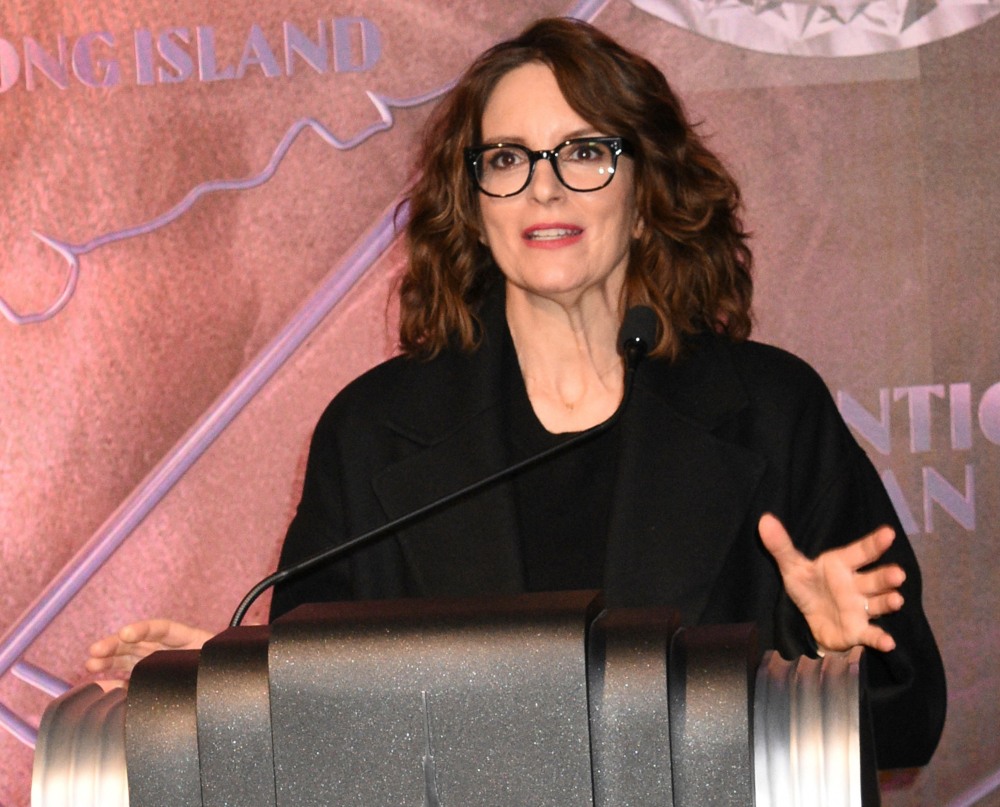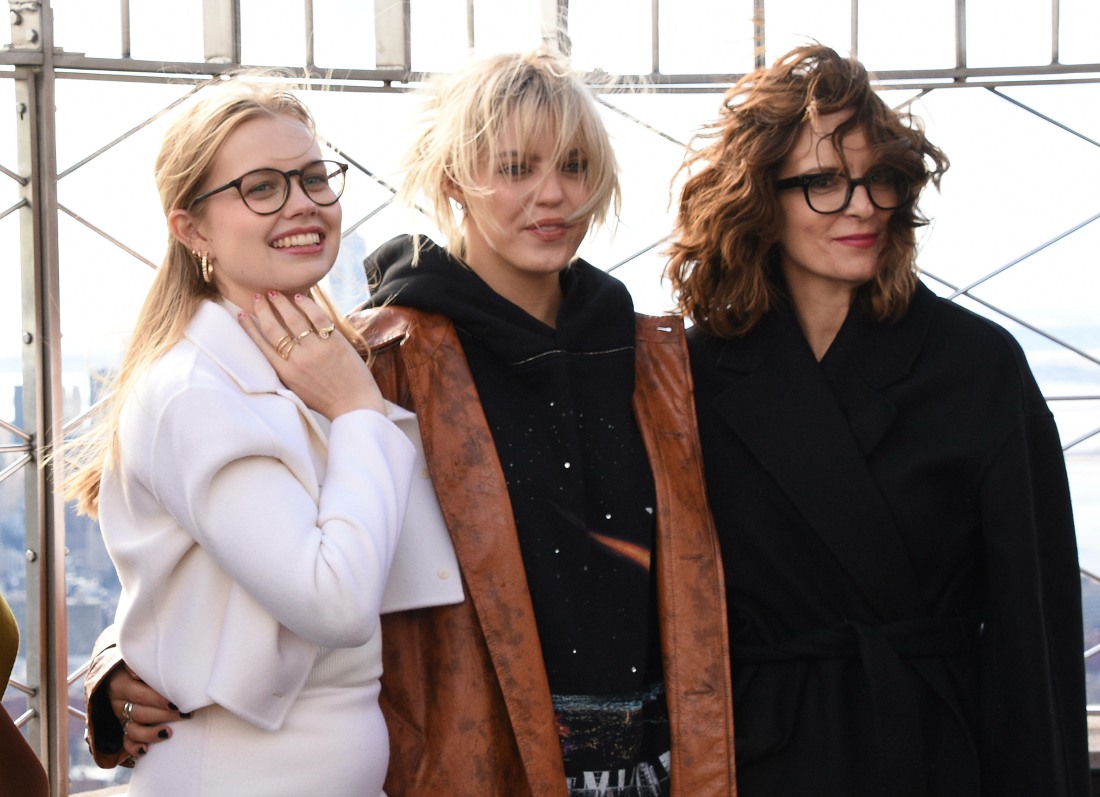ARTICLE AD
Are people interested in the Mean Girls musical movie? I genuinely can’t tell if people are like “hell yeah, this will be kitsch fun” or whether it’s just seen as a money-grab. It’s sort of an updated remake with music from the Broadway musical adaptation, with Tina Fey constantly updating the jokes, characters, script and what have you. Tina recently chatted with the New York Times about the new film and how she’s updated a lot of the jokes. I’m still trying to figure out if people are into it?
On the tagline “This isn’t your mother’s ‘Mean Girls’”: “That came from the Paramount marketing department. I want to comfort millennials by telling them that’s just an expression in the English language. And also, when the movie came out, some people who were older than you also went to it. Some people as old as 26 or 27 may have been in the theater with you.
The edits Fey made to many of the less acceptable jokes: “I was writing in the early 2000s very much based on my experience as a teen in the late ’80s. It’s come to no one’s surprise that jokes have changed. You don’t poke in the way that you used to poke. Even if your intention was always the same, it’s just not how you do it anymore, which is fine. I very much believe that you can find new ways to do jokes with less accidental shrapnel sideways.
Name-calling in the modern age: “If we really had people speak to each other the way they spoke to each other in 1990, everyone would go to the hospital. People were really rough. People are still horrible, they’re just more likely to anonymously type it. I would like to take but not teach a graduate school class on the ways in which people are just as divisive and horrible as they ever were, but now they couch it in virtue.
Regina isn’t homophobic: “I know that even Regina would know what wouldn’t fly. She’s going to find a way to inflict pain on people, but she’s not going to get herself in trouble. For example, there’s a joke in the original movie when Janis gets up on the table and Regina says, “Oh my God, it’s her dream come true: diving into a huge pile of girls.” It was mine and Sam Jayne’s feeling that Regina wouldn’t try that now because she knows the kids around her would be like, “That’s homophobic.” She would know not to be homophobic, and hopefully, truly would not be homophobic.
When Regina gains weight in the movie musical, the other students’ initial reaction is positive — but then she’s still shamed. “Look at the famous people that influence Gen Z, and we’re still always talking about their bodies. We’re either attacking other people for talking about it, or commending people for being a size, or we’re questioning how they got to a different size. It felt like a line to figure out. We still want to be talking about how weird and messy everything is for girls, while acknowledging that these standards aren’t mandatory — but a lot of people are still signing up for them.
Cultural shifts since the 2018 Broadway show: “If anything, these behaviors have jumped way beyond just young women. It’s in our politics. It’s in everything. People now like to candy-coat and be very virtuous pointing out why you’re a problem, but it’s the same behavior. It’s still, “Don’t look at me. Look at them. I’m doing great. I might not have nice hair, but she’s fat.”
The idea of bringing back the original cast & making a straight sequel: “I have a feeling Paramount would love that. I have not really thought much about that. To me, part of why the stakes are so high in the story is because everyone’s so young and feelings are huge, love is huge and friendship is huge in a way [that it isn’t with] middle-age moms. I love writing about middle-aged people, but I don’t know.
She did approach the original cast members to make cameos but it didn’t work out: “We’ll never know. They’re busy people, so it didn’t come together, but we tried, and we all love each other.
I find all of the conversations about the changing landscape of comedy writing really interesting, and I like what Fey says about understanding that you can’t have teenagers saying certain things these days, but there’s just a baseline of “these are universal experiences” too. “We still want to be talking about how weird and messy everything is for girls, while acknowledging that these standards aren’t mandatory — but a lot of people are still signing up for them.” That’s exactly what is happening, going hand in hand with people are still horrible, but now they’re couching it in virtue-signaling and they’re doing it online. Girls are still mean to each other, people still call each other names, people still feel uncomfortable and awkward in their bodies, but every generation sucks in different ways.
Photos courtesy of Avalon Red, Cover Images.
 Tina Fey bei der Premiere des Konifilms Mean Girls: Der Girls Club im AMC Lincoln Square Theater. New York, 08.01.2024 *** Tina Fey at the premiere of the conifilm Mean Girls The Girls Club at the AMC Lincoln Square Theater New York, 08 01 2024 Foto:xB.xHinex/xFuturexImagex mean_4121,Image: 835419463, License: Rights-managed, Restrictions: imago is entitled to issue a simple usage license at the time of provision. Personality and trademark rights as well as copyright laws regarding art-works shown must be observed. Commercial use at your own risk., Model Release: no, Credit line: IMAGO/Barbara Hine / Avalon
Tina Fey bei der Premiere des Konifilms Mean Girls: Der Girls Club im AMC Lincoln Square Theater. New York, 08.01.2024 *** Tina Fey at the premiere of the conifilm Mean Girls The Girls Club at the AMC Lincoln Square Theater New York, 08 01 2024 Foto:xB.xHinex/xFuturexImagex mean_4121,Image: 835419463, License: Rights-managed, Restrictions: imago is entitled to issue a simple usage license at the time of provision. Personality and trademark rights as well as copyright laws regarding art-works shown must be observed. Commercial use at your own risk., Model Release: no, Credit line: IMAGO/Barbara Hine / Avalon
 NEW YORK, NY – JANUARY 10: Angourie Rice, ReneŽ Rapp and Tina Fey pictured as the cast of Mean Girls, in partnership with Girls Inc., light the Empire State Building pink celebrating its premiere in New York City on January 10, 2024. Copyright: xmpi099x,Image: 835843128, License: Rights-managed, Restrictions: imago is entitled to issue a simple usage license at the time of provision. Personality and trademark rights as well as copyright laws regarding art-works shown must be observed. Commercial use at your own risk., Model Release: no, Credit line: IMAGO/mpi099 / Avalon
NEW YORK, NY – JANUARY 10: Angourie Rice, ReneŽ Rapp and Tina Fey pictured as the cast of Mean Girls, in partnership with Girls Inc., light the Empire State Building pink celebrating its premiere in New York City on January 10, 2024. Copyright: xmpi099x,Image: 835843128, License: Rights-managed, Restrictions: imago is entitled to issue a simple usage license at the time of provision. Personality and trademark rights as well as copyright laws regarding art-works shown must be observed. Commercial use at your own risk., Model Release: no, Credit line: IMAGO/mpi099 / Avalon
 NEW YORK, NY – JANUARY 10: Tina Fey pictured as the cast of Mean Girls, in partnership with Girls Inc., light the Empire State Building pink celebrating its premiere in New York City on January 10, 2024. Copyright: xmpi099x,Image: 835843170, License: Rights-managed, Restrictions: imago is entitled to issue a simple usage license at the time of provision. Personality and trademark rights as well as copyright laws regarding art-works shown must be observed. Commercial use at your own risk., Model Release: no, Credit line: IMAGO/mpi099 / Avalon
NEW YORK, NY – JANUARY 10: Tina Fey pictured as the cast of Mean Girls, in partnership with Girls Inc., light the Empire State Building pink celebrating its premiere in New York City on January 10, 2024. Copyright: xmpi099x,Image: 835843170, License: Rights-managed, Restrictions: imago is entitled to issue a simple usage license at the time of provision. Personality and trademark rights as well as copyright laws regarding art-works shown must be observed. Commercial use at your own risk., Model Release: no, Credit line: IMAGO/mpi099 / Avalon
 New York World premiere of ‘Mean Girls’ at AMC Lincoln Square
Featuring: Tina Fey and Lindsay Lohan
Where: New York, New York, United States
When: 08 Jan 2024
Credit: Marion Curtis/StarPix for Paramount/startraksphoto.com
New York World premiere of ‘Mean Girls’ at AMC Lincoln Square
Featuring: Tina Fey and Lindsay Lohan
Where: New York, New York, United States
When: 08 Jan 2024
Credit: Marion Curtis/StarPix for Paramount/startraksphoto.com

 1 year ago
77
1 year ago
77 



